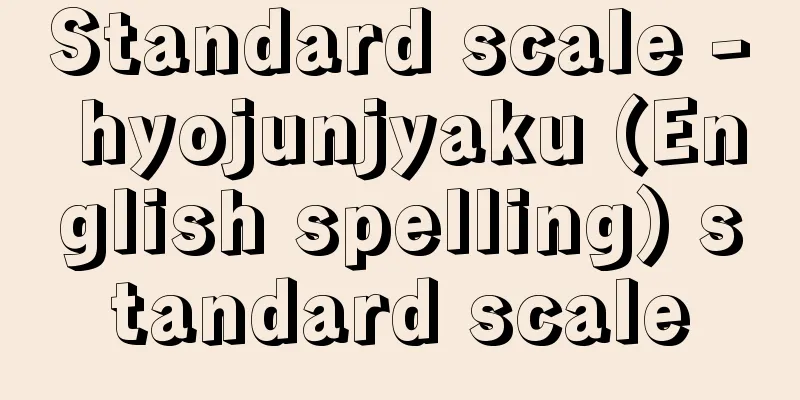Mood state ratio - Mood state ratio

|
For example, schizoids are expressed as the ratio of sensitivities between the two poles of "sensitive" and "insensitive" (more precisely, the mental sensitivity ratio), and are therefore subdivided into a timid and timid hypersensitive type, an intermediate type, and an indifferent and cold insensitive type. Cyclothymia is expressed as the ratio of temperament between the two poles of "cheerful" and "melancholy" (more precisely, the mood state ratio), and is subdivided into a cheerful and active hypomanic type, an intermediate synchronous type, and a melancholic and inactive gloomy type. The difference between schizoids and cyclothymia is most striking in the overall attitude towards life, with schizoids being unsociable, autistic, selfish, and cold, while cyclothymia are open, sociable, caring, and affectionate. *Some of the terminology explanations that refer to "mood state ratio" are listed below. Source | Heibonsha World Encyclopedia 2nd Edition | Information |
|
…たとえば,分裂気質では〈敏感〉と〈鈍感〉という両極をもつ感受性の割合(正確には精神感受性比率)として表現され,したがって,小心で内気な過敏型,中間型,無頓着で冷たい鈍感型に細分される。循環気質では〈快活〉と〈憂鬱〉という両極をもつ気質の割合(正確には気分状態性比率)として表現され,陽気で活発な軽躁型,中間の同調型,憂鬱で不活発な陰鬱型に細分される。分裂気質と循環気質のちがいは生活態度全体のなかで際立ち,分裂気質は非社交的,自閉的,利己的,冷淡であるのに対して,循環気質は開放的,社交的,世話好きで,情に厚い。… ※「気分状態性比率」について言及している用語解説の一部を掲載しています。 出典|株式会社平凡社世界大百科事典 第2版について | 情報 |
<<: "Kibun Daijinkuruwa no Irifune" - Kibun Daijinkuruwa no Irifune
>>: "Kibunjitsudenchojaeitaikagami" - Kibunjitsudenchojaeitaikagami
Recommend
Sarrusophone (English spelling)
A type of wind instrument. It is made of a double ...
Nazran' (English spelling)
…A republic in the North Caucasus of the Russian ...
Blackett, Patrick Maynard Stuart, Baron
Born: November 18, 1897, London [Died] July 13, 19...
Soest, K.von (English spelling)
…The illustrations of the calendar in the “Prayer...
Colonel [town] - Osa
A former town in Atetsu District, northwest Okayam...
Akimasa Ikeda
1836-1903 Daimyo and aristocrats from the late Ed...
Osarizawa mine tailings dam collapse incident
...After that, it developed as a central mine for...
Micro-burins
...One type is stone tools made using small stone...
Kashinryuu - Kashinryuu
…Tanaka Kaku-o was the first to claim to be head ...
Covalent nitrides - Covalent nitrides
...They are ionic and react with water to produce...
Proca
...The Aeneid was overwhelmingly influenced by Gr...
Imamura Shiko - Imamura Shiko
Japanese painter. His real name was Jusaburo. He ...
Beauchamp, P. (English spelling) BeauchampP
…Not to mention lyrics and musical scores, dance ...
Imperial Rescript - Chokgo
[1] [noun] ① The words of the Emperor. Imperial co...
Gleizes, A.
...The Puteaux School continued its wave of demon...






![Hoechst [company] - Hoechst](/upload/images/67ccc74e58d9d.webp)


